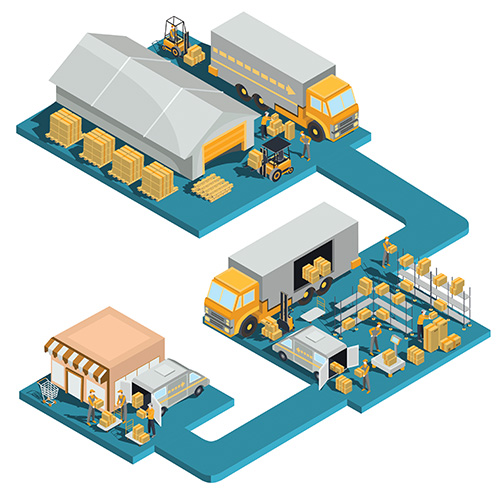Supply Chain Management for The Future
Supply Chain Management for The Future
A firm's supply chain risk is defined as a combination of likelihood and impact associated with the disruption of supply, internal-manufacturing, and delivery operations, i.e., the entire set of supply chain activities. New research by Drs. Shakeel Sadiq Jajja, Kamran Ali Chatha and Sami Farooq identifies how companies can cope with supply chain risk by using integrative practices with suppliers and customers in order to enhance agility performance.
Supply chain risks stem from diverse factors, such as the firm's supply and customer base, regulatory regime, forecasting capability, transportation means, labour issues, and firm size. Strategic collaboration with key supply chain partners and an effective and efficient management of intra- and inter-organisational activities related to the flow of products, services, information, finance and joint decision-making are all part of supply chain integration.
This research also focuses on agility performance, and how supply chain risk and integrative practices affect agility outcomes and metrics. Agility performance outcomes and metrics generally relate to enhanced product customisation, shortened new product development and lead time, reduced system changeover time and cost, and efficient scaling up and down of operations. The researchers use Dynamic Capabilities View to examine relationships between a firm’s supply chain risk, supply chain integration, and agility performance.
The authors highlight the importance of supplier and customer integration to achieve enhanced agility performance. Suppliers and customers are the source of supply and demand markets information, which is a key input in the organisational sense-making process in risk prone circumstances. Imperfect connections with key suppliers or customers would have weakening and cascading effects on the firm's planning, organising, and controlling of supply chain activities for agility performance. Thus, managers should develop integrative practices with key suppliers and customers to manage risk and enhance agility performance.
In addition, this research finds that internal integration also positively affects agility performance by enabling supplier and customer integration. Managers should view supplier and customer integration as direct antecedents of agility performance and internal integration as an enabler of supplier and customer integration. In conclusion, all three elements of supply chain integration have different but important roles in enhancing agility performance.
Reference:
Jajja, M. S. S., Chatha, K. A., & Farooq, S. (2018). Impact of supply chain risk on agility performance: Mediating role of supply chain integration. International Journal of Production Economics, 205, 118-138.
doi:10.1016/j.ijpe.2018.08.032
About the Author
 Muhammad Shakeel Sadiq Jajja is Assistant Professor at the SDSB, LUMS. He teaches courses in operations, supply chain management, supply chain analysis, and innovation and technology management. He is the Faculty Director of the Rausing Executive Development Centre (REDC). He is also the Director for the Executive Certificate programme on Agri & Dairy Business Management (ECAM) at the REDC, LUMS. His research interests include supply chain management, technology and innovation in supply chain relationships, social and environmental compliance in supply chain relationships, and operations management. His research has been published in the International Journal of Operations and Production Management and International Journal of Production Economics.
Muhammad Shakeel Sadiq Jajja is Assistant Professor at the SDSB, LUMS. He teaches courses in operations, supply chain management, supply chain analysis, and innovation and technology management. He is the Faculty Director of the Rausing Executive Development Centre (REDC). He is also the Director for the Executive Certificate programme on Agri & Dairy Business Management (ECAM) at the REDC, LUMS. His research interests include supply chain management, technology and innovation in supply chain relationships, social and environmental compliance in supply chain relationships, and operations management. His research has been published in the International Journal of Operations and Production Management and International Journal of Production Economics.
Email: ssj@lums.edu.pk

